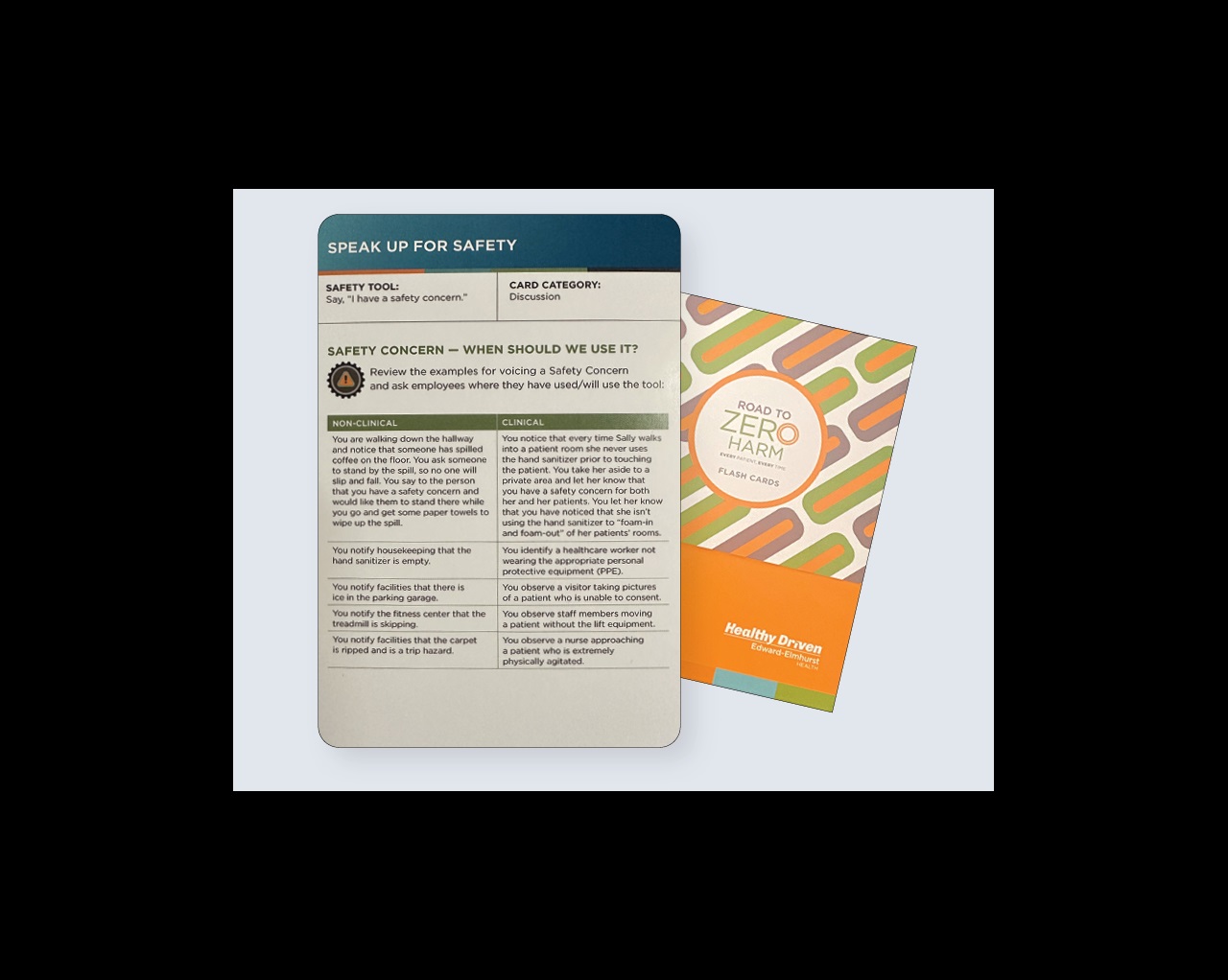When it comes to the satisfaction of our patients, as well as their safety, most of us read the latest research to keep up to date on successes and ways to improve. No doubt many of us are aware of the 2022 report by the Office of Inspector General (“Adverse Events in Hospitals: A Quarter of Medicare Patients Experienced Harm in October 2018”) that found patient harm from medical errors, including healthcare-associated infections, falls, medication errors, and delayed or omitted care, was experienced by 25% of hospitalized Medicare patients during their hospital stays. The results of this study contributed to calls for increased leadership and action around patient safety.
Given the scale and persistence of patient harm in hospitals, Elmhurst (Ill.) Hospital leadership took these and other findings to heart and decided the hospital was going to be “ultra safe” with a goal of zero harm.
Encouraging Everyone to Speak Up
Avoiding harm to patients is the first responsibility and is called out in Elmhurst Hospital’s vision of “Safe, Seamless and Personal Care.” Words alone are not enough; therefore, hospital leadership’s commitment to reducing harm is expressed through actions and evidence-based solutions.
Drawing on the science of safety, as seen in high-reliability cultures, hospital leaders implemented strategies that included a safe environmental design, monitoring technologies, protocols and procedures, and tools to enhance patient safety. One strategy was the development of a safety culture in which everyone is expected to speak up about patient safety concerns to avoid errors and adverse patient outcomes. The phrase “I have a safety concern” is an important component of Elmhurst Hospital’s culture of safety. This phrase is a way for staff to raise concerns when they become aware of a safety incident or potential risk. Healthcare practitioners, especially front-line staff, are often the first to observe unsafe conditions and can bring them to the attention of those who can remediate them.
To drive home the importance of speaking up, Elmhurst Hospital leaders created a Good Catch award to recognize staff members—as individuals or as members of a team—who spoke up to improve patient safety. Senior leaders review Good Catch nominations and select an honoree each month to recognize with a traveling trophy. A steady decrease in patient safety events has followed from this initiative. For example, the hospital’s Serious Safety Event rate, which is tracked monthly, experienced a reduction from a baseline rate of 2.25 in 2017 to 0.5 after three years, and has seen a further reduction to 0.05 to date.
Supporting All Staff
Though there are numerous studies that demonstrate the positive relationship between speaking up and patient safety, Elmhurst Hospital leaders acknowledged that some staff members may feel uncomfortable or hesitant to speak up. The hospital also recognizes that leaders who respond to medical errors with individual blame and punishment may limit future reporting, which can impede patient safety efforts. Conversely, a culture of openness about speaking up about safety concerns contributes to creating and maintaining trust throughout the organization, according to research published in the Feb. 8, 2014, issue of BMC Health Services Research (“Speaking up for patient safety by hospital-based health care professionals: a literature review”).
According to data from the Agency for Healthcare Research and Quality “Hospital Survey on Patient Safety Culture” (results from questions about communication openness), employees who perceive supervisors as open and supportive of a patient safety culture often increase their incidences of speaking up for patient safety. And leaders who encourage direct, informal interaction with employees at multiple levels encourage higher levels of speaking up.
To empower leaders to encourage their team members to speak up about patient safety, all staff at the hospital participated in a one-day peer-to-peer training program. Called “Road to Zero Harm,” the program emphasized a culture of high reliability, safety and the value of speaking up. Leaders work with managers to support all staff, regardless of their position and specialty, to voice concerns related to patient safety without fear of reprisal. Initiatives revolve around team building, leadership rounding, shadowing staff and strengthening a culture of safety. As a result of the training, leaders at the hospital reward, praise and expect speaking up for safety.
The perceived safety of speaking up at Elmhurst Hospital is reinforced by a psychologically safe work environment that mitigates initial concerns about speaking up related to lack of confidence, fear of embarrassment if wrong about a safety concern and a disproportionate authority gradient. All staff are empowered to use tools when they believe something is wrong, including a standardized rubric for communication called SBAR (situation, background, assessment, recommendation). Using the phrase “I have a safety concern” provides a clear understanding among all team members regarding the gravity of the safety concern being raised.
Elmhurst Hospital’s team culture also supports an environment where a willingness to speak up is supported. A strong team culture is associated with open employee communication based on trust, shared perceptions of the importance of patient safety and employee confidence in organizational error-prevention strategies. For instance, every work team, from the OR to food service at the hospital, has a manager or leader who understands the value of speaking up as a way to understand insights and ideas gained from front-line workers that can inform the organization’s patient safety strategy.
To reinforce this team culture, a deck of 36 educational flash cards created in-house provides guidance for leaders in encouraging various safety behaviors, including speaking up for safety. The cards help facilitate discussions between leaders and their team members about patient safety.
Keeping Communication Open
The fact that communication plays a large role in medical errors has been widely acknowledged. In its Sentinel Event Data 2022 Annual Review, The Joint Commission reported failures in communication among its top three most frequently identified root causes of serious safety events. Today, Elmhurst Hospital’s quest for zero harm is supported by a culture of communication openness. Each employee, including the president, is trained to speak up if they see something that’s not right and say, “I have a safety concern.” With that simple phrase, which everyone respects, the concern is immediately investigated by operational and patient safety leaders. The 2019 AHRQ Hospital Survey on Patient Safety Culture 2.0 includes a composite measure on communication openness, including four questions about speaking up. Elmhurst’s results on these four questions in 2022 exceeded the AHRQ 2022 database average percent of positive responses of 400 participating hospitals.
Speaking up is one of the critical behaviors of Elmhurst Hospital’s patient safety culture. As a result of its initiatives to encourage speaking up, the hospital has seen ongoing improvement in measures of employee engagement and patient safety event rates year after year. Speaking up for patient safety has been shown to improve outcomes for patients, turning what could have been fatal errors into near misses. The hospital has found that open and supportive leadership play a critical role in supporting a willingness to speak up with confidence about patient safety concerns, even when work is intense and the stakes are high.
Kimberley Darey, MD, FACOG, is president of Elmhurst (Ill.) Hospital (Kim.Darey@eehealth.org). Sherri Leahy, PhD, RN, is vice president, south region, quality, patient safety, patient experience, and care coordination, at Elmhurst (Ill.) Hospital (Sherri.Leahy@eehealth.org).



